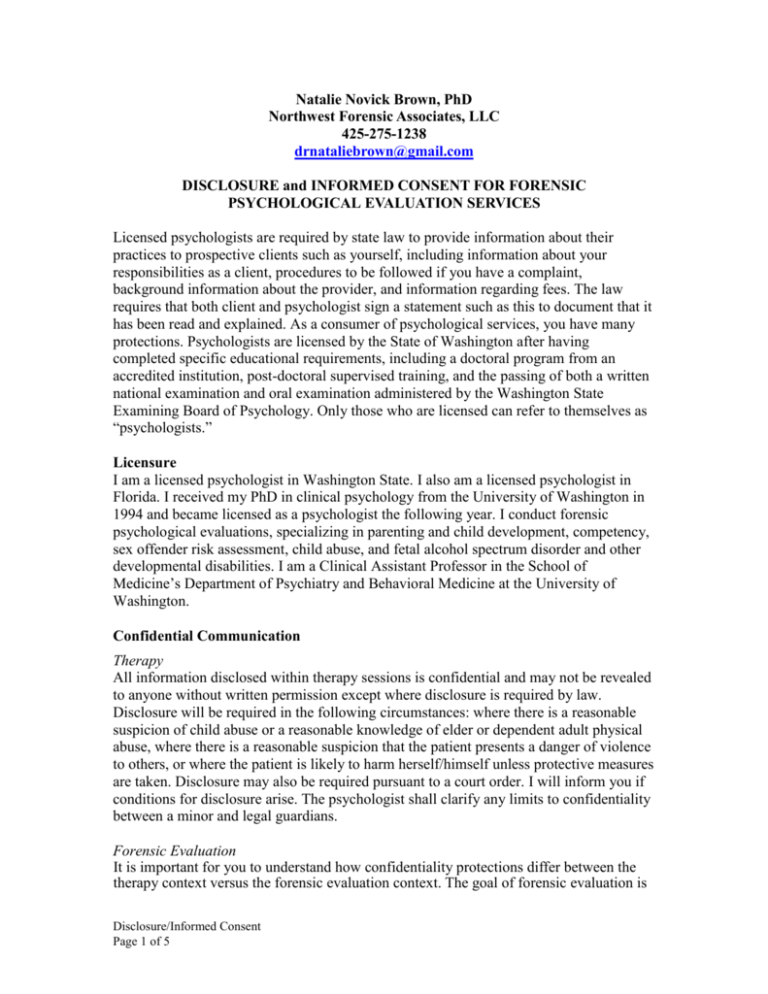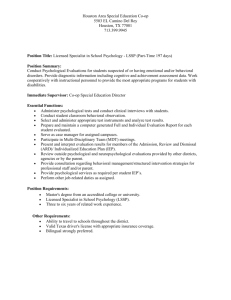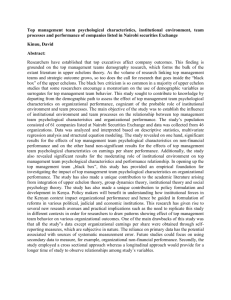
Natalie Novick Brown, PhD
Northwest Forensic Associates, LLC
425-275-1238
drnataliebrown@gmail.com
DISCLOSURE and INFORMED CONSENT FOR FORENSIC
PSYCHOLOGICAL EVALUATION SERVICES
Licensed psychologists are required by state law to provide information about their
practices to prospective clients such as yourself, including information about your
responsibilities as a client, procedures to be followed if you have a complaint,
background information about the provider, and information regarding fees. The law
requires that both client and psychologist sign a statement such as this to document that it
has been read and explained. As a consumer of psychological services, you have many
protections. Psychologists are licensed by the State of Washington after having
completed specific educational requirements, including a doctoral program from an
accredited institution, post-doctoral supervised training, and the passing of both a written
national examination and oral examination administered by the Washington State
Examining Board of Psychology. Only those who are licensed can refer to themselves as
“psychologists.”
Licensure
I am a licensed psychologist in Washington State. I also am a licensed psychologist in
Florida. I received my PhD in clinical psychology from the University of Washington in
1994 and became licensed as a psychologist the following year. I conduct forensic
psychological evaluations, specializing in parenting and child development, competency,
sex offender risk assessment, child abuse, and fetal alcohol spectrum disorder and other
developmental disabilities. I am a Clinical Assistant Professor in the School of
Medicine’s Department of Psychiatry and Behavioral Medicine at the University of
Washington.
Confidential Communication
Therapy
All information disclosed within therapy sessions is confidential and may not be revealed
to anyone without written permission except where disclosure is required by law.
Disclosure will be required in the following circumstances: where there is a reasonable
suspicion of child abuse or a reasonable knowledge of elder or dependent adult physical
abuse, where there is a reasonable suspicion that the patient presents a danger of violence
to others, or where the patient is likely to harm herself/himself unless protective measures
are taken. Disclosure may also be required pursuant to a court order. I will inform you if
conditions for disclosure arise. The psychologist shall clarify any limits to confidentiality
between a minor and legal guardians.
Forensic Evaluation
It is important for you to understand how confidentiality protections differ between the
therapy context versus the forensic evaluation context. The goal of forensic evaluation is
Disclosure/Informed Consent
Page 1 of 5
to provide information to the requesting party (e.g., attorney, agency, or court) who has
solicited information about how you, your child(ren), or your ward functions
psychologically. The evaluation itself usually consists of at least one face-to-face
interview and psychological testing, telephonic interviews with collateral individuals, and
review of relevant documents such as court records, depositions, transcripts, medical
records, and other materials. I also will review any additional materials that you think are
relevant and important.
In most cases, a forensic evaluation is intended for use in some type of legal proceeding.
Thus, in the forensic context, you are consenting to different rules of confidentiality
where disclosure and evaluation results are determined by the rules of the legal system.
If your attorney has requested this evaluation, he/she will receive a copy of my
report, if a report is requested. The results are typically protected under attorneyclient privilege.
If this is a court-ordered psychological evaluation because you have been charged
with a crime, the results typically go to your attorney, who then provides the report
to the court and prosecutor. There are fewer legal protections in this context as
typically there is no confidentiality or privilege. Anything you say (or that others
say about you) may end up in my report. The court “owns” the report, and I have
no authority over it once it has been submitted.
If this is a court-ordered or stipulated parenting evaluation, the results (including
all of the information I have relied on) are not protected. My report will go to
counsel for both parties and to the guardian ad litem (if one is involved). I no
longer have authority over the report once it has been submitted. You may request
to your attorney that my report be “sealed” to increase your protections. I am not
involved in that process.
If the matter in which you are involved involves criminal allegations, charges, or past
convictions, and/or civil commitment, or community registration, it is very important for
you to understand that anything you say to me and all other information in my record of
your services may be used against you in legal proceedings. (Legal proceedings usually
fall into administrative, civil, or criminal matters. If you do not understand the
differences, please consult with your attorney.)
Access to Records
A record is kept of the health care services provided to you. You may want to see and
copy that record. You also may ask to correct that record. You may see your record or get
more information about it by putting your request in writing and submitting it to my
office. A response to your request will be made within 15 working days in compliance
with RCW 70.02.080. Access may mean an appointment to review your record in person.
Justifications for denial of your request to access records include: the request may result
in the possibility of injury or harm to the patient, the request may reveal the identity of a
person who provided information in confidence, or the disclosure may endanger others.
Patients may be charged a fee for copying the record, and a fee also may be charged for
search, editing, and copying. We may collect the fee before releasing the records.
I will not release information in my files regarding you to anyone unless instructed to do
so by you (and the other party, if this is a parenting evaluation) or ir ordered to do so by a
Disclosure/Informed Consent
Page 2 of 5
court or administrative body of competent jurisdiction.
If you have any concerns about the use or distribution of my report and related
information, you should discuss these issues carefully with your attorney.
Voluntary Participation
Your participation in psychological services and/or evaluation, including the decision to
answer any questions, is voluntary. I will not provide psychological services to you
without your signature on this document. You have the right to stop my services at any
time or refuse to answer any questions. There may be legal consequences if you stop a
court-ordered evaluation or refuse to answer some of my questions; therefore, it would be
in your best interest to consult with your attorney beforehand so that you understand the
potential consequences.
Financial Requirements
My hourly fee for forensic evaluation is $250 ($225 for local cases); my hourly rate for
psychological consultation or therapy is $200. Usually, I receive a retainer in advance of
performing any professional work in a case. The retainer for one-party psychological
forensic evaluations is $5,000; the retainer for parenting evaluations is $7,500. The
retainer for psychological consultation or therapy is $1600. The retainer may not cover
all of the cost of the services. If you have financial constraints, please discuss this with
me at our first session, and I may make an adjustment. If funds are depleted in your
retainer, I reserve the right to terminate services at that point until such time as funds are
replenished.
Fees are based on the amount of time that psychological services are rendered to the
patient, to members of the patient's family or relevant others, or in consultation with
anyone regarding the designated patient. Fees may include interviews by phone or in
person, psychological testing/scoring/interpretation, email correspondence or phone
contact with you, consultation with others (e.g., counsel), collateral interviews with
relevant others, record review, report writing, responding to court orders regarding your
case, and/or testimony and testimony preparation. Psychotherapy sessions typically last
50 minutes. Each appointment is held exclusively for you. If you must cancel, leave a
message at least two days in advance. If you cancel later than this, you may be charged
for the full amount of the session.
Payment of retainer is expected by cash or check at the time of service. I do not bill
insurance carriers, and most do not cover psychological testing, consultation, or any other
forensic services. Your insurance company may or may not reimburse you for my
services, but it is up to you to apply for reimbursement. After you have submitted an
initial retainer, you may request that we bill you monthly. We bill in 15-minute
increments and round up or down to the closest interval (e.g., a 20-minute phone call
would be billed at the 15-minute rate; a 25-minute phone call would be billed at the 30minute rate).
Complaints
Complaints regarding my adherence to ethical standards may be addressed to the
Washington State Department of Health, Examining Board of Psychology, 1300 Quince
Street SE, Olympia, WA, 98504-7869. If you have a concern or complaint, the phone
number is 360-236-4910.
Disclosure/Informed Consent
Page 3 of 5
Electronic Data
Electronic transmissions (including but not necessarily limited to phone, facsimile, and
electronic mail) may be involved in this matter and may refer to you or your child or
ward. You should be aware that there are risks to privacy and limits of confidentiality
involved in such transmissions. Telephone calls may not be private (e.g., I may need to
leave a message in regard to you on a voicemail that may not be confidential), emails or
facsimiles may be copied and held by various computers or machines as it goes from
sender to recipient, and, in addition, such communications may be intercepted by persons
improperly accessing the transmissions. I will only use electronic communications with
you if you agree to accept these risks. Please initial here that you would like to grant
permission to use electronic communications:_____
Interim Reports
I will not provide interim reports that precede full analysis of all important issues in a case. I
will provide an addendum to my report in the event of new information that I receive after
my report has been submitted, if the new information materially changes my opinion.
Testimony
Once a decision has been made to use any report generated as a result of this evaluation in
a legal proceeding, the report and any other information that was provided, obtained,
and/or created about your mental health and functioning or that of your child or ward
may be admissible into evidence (including the possibility of any past reports or records,
if any). If I am asked to testify about an evaluation I have conducted, all information
pertaining to your evaluation may be disclosed.
If, at any time, you have a question about any aspect of the evaluation or these
procedures, please feel free to ask me. In addition, if at any time you need a break from
an interview or testing, please let me know and we will stop. Once the evaluation is
completed, and with the permission of the requesting party (if other than yourself), I may
be able to have a meeting with you to explain the results and answer any questions you
might have.
Additional Risks
Psychological evaluation or therapy often feels intrusive in that it involves questions
regarding psychosocial history (which may include sexual behavior in pertinent
contexts), current mental status, current level of support from significant others, marital
satisfaction, family background, and your psychological well-being (as well as that of
your family). The evaluation process and the discussion of life experiences can be
emotionally distressing. Most people go through the process without difficulty. While it is
unlikely, you might experience one or more of the following as a result of our work
together: depression, frustration, anger, disappointment, stress, grief, interpersonal
difficulties, conflict with loved ones, temporary impairment in daily functioning,
temporary sexual dysfunction, anxiety or panic, alteration of emotional well-being, or
triggering of traumatic memories, especially those involving physical or sexual
abuse/trauma. This is not an exhaustive list and you may experience other feelings.
I/We understand the nature and purposes of these psychological
services, including the associated risks.
I/We understand there is no certainty that I/we will achieve any
Disclosure/Informed Consent
Page 4 of 5
benefit from these psychological services.
I/We have been fully informed of the risks and I/we freely assume
them.
I/We agree to participate in these psychological services and in all of
the testing that might be conducted during the process.
A copy of this form is as valid as the signed original.
_____________________________
Printed Name:
_____________________________
Printed Name:
_____________________________
Signature:
_____________________________
Signature:
Date: ________________________
Date: ________________________
____________________________
Dr. Natalie Novick Brown:
Date:________________________
Disclosure/Informed Consent
Page 5 of 5





